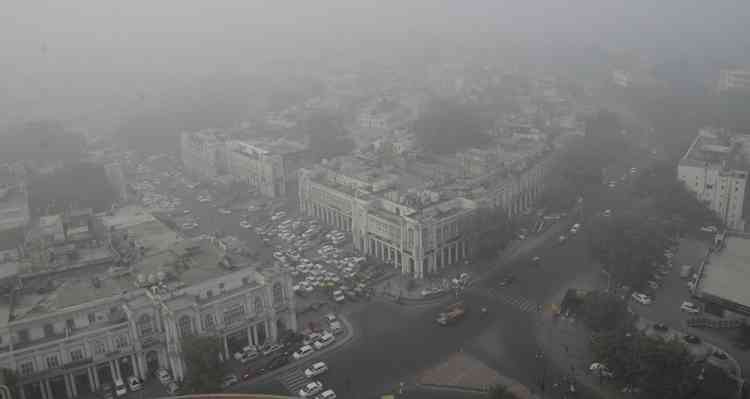Air pollution harms heart cells in kidney patients, warn experts

By Rachel V. Thomas
New Delhi, Nov 12 (IANS) As the Delhi-National Capital Region (NCR) gasps for clean air amid the overall Air Quality Index (AQI) shooting to severe levels, health experts warned on Friday that increased exposure to particulate matter (PM) 2.5 can worsen disease progression for chronic kidney patients, as well as cause damage to their heart muscle cells.
Delhi woke up to shallow fog on Friday with reduced visibility and an overall AQI of 390 under the 'very poor' category.
On Thursday, Delhi recorded the 24-hourly AQI at 411. Most of the 39 air quality monitoring stations in the national capital recorded air pollution levels in the 'severe' category.
Even Ghaziabad's Air Quality Index (AQI), which has been reeling under a 'severe' category since Diwali, continued to remain at the same level, i.e., at 488 on Friday.
According to Manju Aggarwal, Chief, Medical Services and Chairperson- Nephrology, Artemis Hospital, Gurugram, chronic kidney disease patients usually have underlying cardiovascular disease.
"Risk of developing cardiovascular disease is as high as 20 times in kidney patients. Air pollution adds to these problems by causing hypertension and leads to worsening hypertension, frequent heart attacks and strokes," Dr Aggarwal told IANS.
Dr Amit K Devra, Director, Urology & Kidney Transplantation, Jaypee Hospital, said that epidemiological studies have suggested that PM2.5, made of fine particles present in the air, is directly linked with a decline in glomerular filtration rate (GFR) -- a test used to check how well the kidneys are working and further progression of chronic kidney disease.
A recent study, led by researchers at Case Western Reserve University in the US, found that air pollution exposure in patients with chronic kidney disease was linked with increased levels of Galectin 3 -- a marker of myocardial fibrosis and remodelling associated with air pollution exposure in hypertensive patients. Cardiac fibrosis is a scarring event in the cardiac muscle.
The heart and kidneys are closely linked to each other and so, air pollution by damaging any of these organs will worsen the function of the other as well, the experts said.
"PM2.5 also promotes plaque formation thus increasing risk of ischemic heart disease and associated mortality especially in older age groups of chronic kidney disease (CKD) patients. There is further evidence that long exposure of higher nitrogen dioxide and sulfur dioxide in air increases mortality among end-stage renal disease patients," Devra told IANS.
Previous studies have also shown that exposure to bad air is associated with an increased CKD-related morbidity and mortality. Exposure to PM2.5, even at relatively low concentrations, is a risk factor for a lower kidney function and a faster decline in kidney function.
While air pollution has a direct impact on the kidney via pollutants entering blood circulation leading to oxidative stress and kidney damage, there are indirect impacts also via exacerbation of underlying diseases such as cardiovascular, hypertension and diabetes.
"Challenge is that despite a growing awareness of kidney damage related to air pollution, large gaps still exist between the exact toxicological effect of particles on the kidney and the increasing prevalence of air pollution-related kidney diseases," Anuja Porwal, Additional Director, Nephrology, Fortis Hospital, Noida, told IANS.
Besides affecting the kidneys, rising PM levels are also a strong determinant to poor cardiovascular health. This is in particular for people suffering from heart problems, or those who have suffered from a previous cardiac ailment or stroke, and face inflammatory risks. Rising pollutants can worsen heart health further, the experts said.
"It has been found that PM 2.5 and PM 10 levels can lead to high levels of plaque build up and clogged arteries, meaning that any individual can face a bigger risk of heart attacks," Shubhendu Mohanty, HOD -Cardiologist, Sharda Hospital, Greater Noida, said.
Thus, people with prior respiratory or chest complications and even those who have recently recovered from Covid, must watch out for symptoms, go for frequent steam inhalation and use a good quality mask (such as a N95 mask) when stepping out, Mohanty suggested.
Air pollution control should be regarded as a high priority in urban plan and policy making. Actions are required to narrow gaps in knowledge and clean air, thus preventing air pollution-related diseases, the experts noted.
(Rachel V. Thomas can be contacted at [email protected])


 IANS
IANS 








